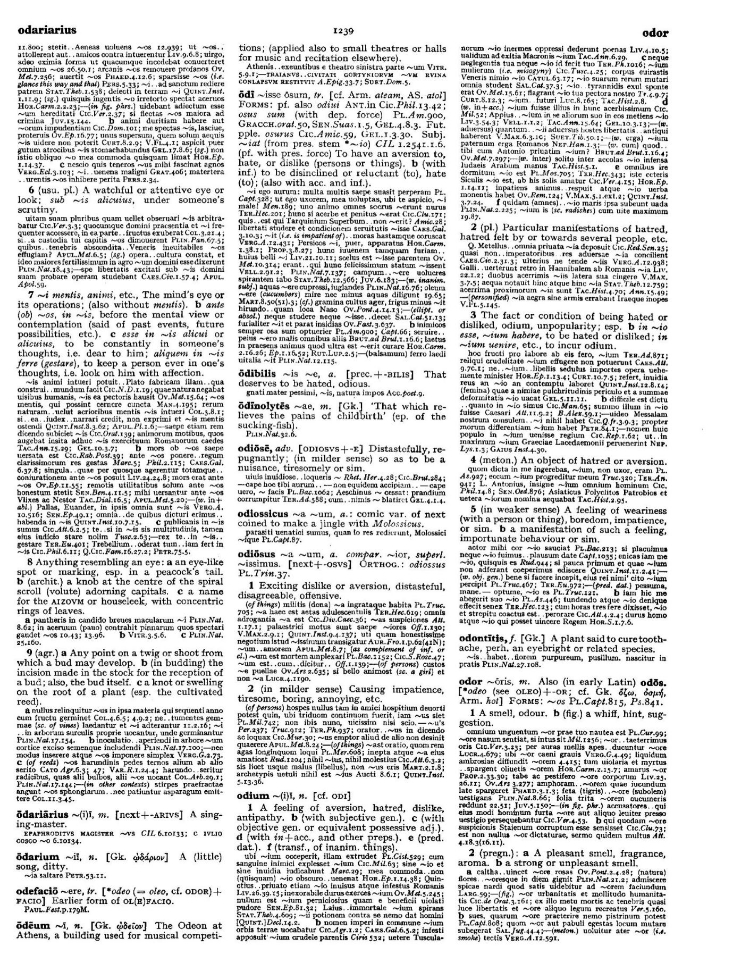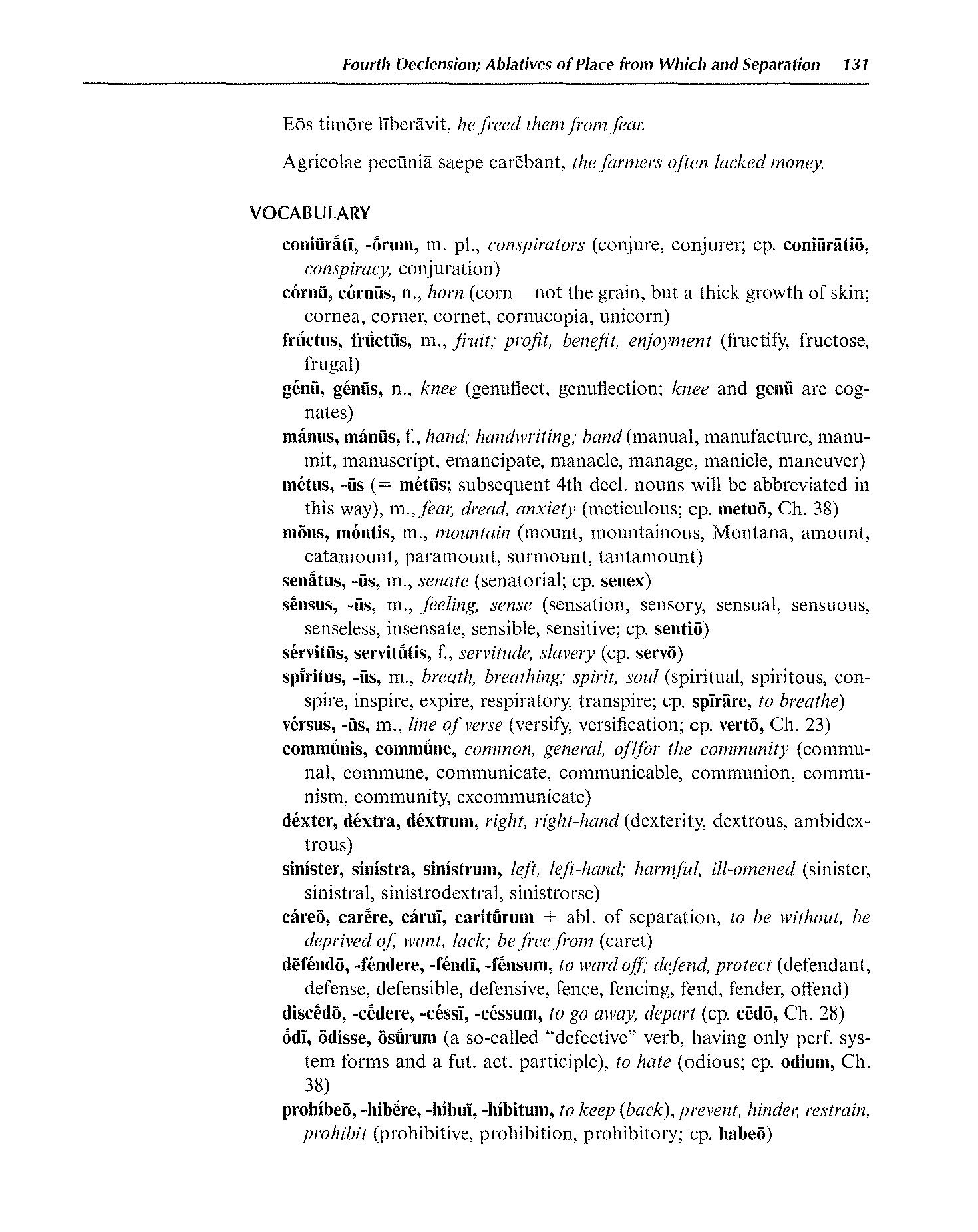
page_listing.tpl
page_subListingDetails.tpl
sub_listingDetails_style1.tpl
sub_listingDetails.title.tpl
ōdisse to hate
ōdisse is a Latin Verb that primarily means to hate.
Definitions for ōdisse
Wheelock's Latin
Verb
- 1
to hate
- 2
a so-called "defective" verb, having only perf. system forms and a fut. act. participle
English derivatives:
odious
Oxford Latin Dictionary
Verb
- 1
To have an aversion to, hate, or dislike (persons or things). (b) (with inf.) to be disinclined or reluctant (to), hate (to); (also with acc. and inf.).
Sentences with ōdisse
Latin to English
Bonī amōre virtūtis peccāre ōdērunt.Compare Good men because of their love of virtue hate to sin.
Odi et amo. Quare id faciam, fortasse requiris. Nescio, sed fieri sentior et exrucior.Compare I hate and love. Why I do so, perhaps you ask. I know not, but I feel it, and I am in torment.
Odi profanum vulgus et arceo; favete linguis. Carmina non prius audita Musarum sacerdos virginibus puerisque canto.Compare I hate the uninitiated crowd and bid them avaunt. Listen all in silence! Strains unheard before I, the Muses' hierophant, now chant to maidens and to boys.
Aut amat aut odit mulier: nihil est tertium.Compare Woman either loves or hates: nothing in between.
Quem metuunt oderunt, quem quisque odit periise expetit.Compare Whom men fear, they hate; whom a man hates he wishes dead.
Teneo alius castra; odi hostis: ego urbs et res urbanus tueor.Compare Let others keep the camp; let them hate the enemy: We will take care of the city and the affairs of the city.
Odisse coepi, postquam parricida matris et uxoris, auriga et histrio et incendiarius extitisti.Compare I began to hate you when you became the murderer of your mother and your wife, a charioteer, an actor, and an incendiary.
Proprium humani ingenii est odisse quem laeseris.Compare It is human nature to hate the man whom you have injured.
Conjugation table for ōdisse
Cactus2000
| ACTIVE | |
| Indicative present | Indicative imperfect |
| - - - - - - | - - - - - - |
| Indicative perfect | Indicative pluperfect |
| ōdī ōdistī ōdit ōdimus ōdistis ōdērunt / ōdēre | ōderam ōderās ōderat ōderāmus ōderātis ōderant |
| Indicative future | Indicative future perfect |
| - - - - - - | ōderō ōderis ōderit ōderimus ōderitis ōderint |
| Subjunctive present | Subjunctive imperfect |
| - - - - - - | - - - - - - |
| Subjunctive perfect | Subjunctive pluperfect |
| ōderim ōderis ōderit ōderimus ōderitis ōderint | ōdissem ōdissēs ōdisset ōdissēmus ōdissētis ōdissent |
Infinitive present - Infinitive perfect ōdisse Infinitive future ōsūrum esse | Imperative present - - Imperative future - - - - |
| PARTICIPLE | ||
| Participle present active | ||
| Participle future active | ||
| ōīminī | ōiēbāmur | |
| ōīminī | ōiēbāmur | |
| ōīminī | ōiēbāmur | |
| ōīminī | ōiēbāmur | |
| ōīminī | ōiēbāmur | |
| Participle perfect passive | ||
| ōiētur | ōiāris / $iāre | |
| ōiētur | ōiāris / $iāre | |
| ōiētur | ōiāris / $iāre | |
| ōiētur | ōiāris / $iāre | |
| ōiētur | ōiāris / $iāre | |
| Gerundive | ||
| ōīrer | ōīrentur | |
| ōīrer | ōīrentur | |
| ōīrer | ōīrentur | |
| ōīrer | ōīrentur | |
| ōīrer | ōīrentur | |
| Gerund | Supine | |
| ō- | ||
| ō- | ||
| ō- | ||
| ō- | ||
| ō- | ||
| PARTICIPLE | ||
| Participle present active | ||
| Nom. | - | - |
| Gen. | - | - |
| Dat. | - | - |
| Acc. | - | - |
| Abl. | - | - |
| Participle future active | ||
| Nom. | ōsūrus | ōsūrī |
| Gen. | ōsūrī | ōsūrōrum |
| Dat. | ōsūrō | ōsūrīs |
| Acc. | ōsūrum | ōsūrōs |
| Abl. | ōsūrō | ōsūrīs |
| Participle perfect passive | ||
| Nom. | ōsus | ōsī |
| Gen. | ōsī | ōsōrum |
| Dat. | ōsō | ōsīs |
| Acc. | ōsum | ōsōs |
| Abl. | ōsō | ōsīs |
| Gerundive | ||
| Nom. | - | - |
| Gen. | - | - |
| Dat. | - | - |
| Acc. | - | - |
| Abl. | - | - |
| Gerund | Supine | |
| Nom. | - | - |
| Gen. | - | - |
| Dat. | - | |
| Acc. | - | |
| Abl. | - | |
Data sources
Notes
- Definitions
- Frederick M. Wheelock, Wheelock's Latin, 6th ed., rev. Richard A. LaFleur (New York, NY: HarperCollins Publishers, 2005): 131.
- P. G. W. Glare, Oxford Latin Dictionary, Vols. 1-8 (Oxford: Clarendon Press, 1982): 1239.
- Word frequencies
- Christopher Francese, "Latin Core Vocabulary," Dickinson College Commentaries, last modified 2014, http://dcc.dickinson.edu.
- Paul B. Diederich, The Frequency of Latin Words and Their Endings, PhD diss., (Columbia University, 1939).
- Louis Delatte, Suzanne Govaerts, Joseph Denooz, and Etienne Evrard, Dictionnaire fréquentiel et index inverse de la langue latine [Frequency Dictionary and Inverse Index of the Latin Language] (Liège, Belgium: Laboratoire d'analyse statistique des langues anciennes de l'Université de Liège [L.A.S.L.A.], 1981): 126.
Bibliography
Allen, Joseph H. Allen and Greenough's New Latin Grammar for Schools and Colleges: Founded on Comparative Grammar. Edited by James B. Greenough, George L. Kittredge, Albert A. Howard, and Benjamin L. D'Ooge. Boston, MA: Ginn & Company, 1903.
Crystal, David. A Dictionary of Linguistics and Phonetics. 6th ed. Oxford, UK: Blackwell Publishing, 2008.
Delatte, Louis, Suzanne Govaerts, Joseph Denooz, and Etienne Evrard. Dictionnaire fréquentiel et index inverse de la langue latine [Frequency Dictionary and Inverse Index of the Latin Language]. Liège, Belgium: Laboratoire d'analyse statistique des langues anciennes de l'Université de Liège (L.A.S.L.A.), 1981.
Diederich, Paul B. The Frequency of Latin Words and Their Endings. PhD diss., Columbia University, 1939.
Francese, Christopher. "Latin Core Vocabulary." Dickinson College Commentaries. Last modified 2014. http://dcc.dickinson.edu/latin-vocabulary-list.
Gildersleeve, Basil L., and Gonzales Lodge. Gildersleeve's Latin Grammar: Third Edition, Revised, and Enlarged. 3rd ed. London, England: Macmillan and Co., 1903.
Glare, Peter G.W. Oxford Latin Dictionary. Vols. 1-8. Oxford, England: Clarendon Press, 1982.
Krüger, Bernd. "Latin Conjugation Tables." Cactus2000. Accessed May 5, 2023. https://latin.cactus2000.de/index.en.php.
Pierson, Nick. "Sound of Text." Accessed October 26, 2019. https://soundoftext.com.
Wheelock, Frederick M. Wheelock's Latin. 6th ed. Revised by Richard A. LaFleur. New York, NY: HarperCollins Publishers, 2005.
Wiktionary Contributors. "Victionarium." Wikimedia Foundation, Inc. Updated March 18, 2019. https://la.wiktionary.org/wiki/Victionarium:Pagina_prima.
Citation
Chicago (17th ed.)
Allo Contributors. "ōdī, ōdisse, ōsūrum (v.) - Latin Word Definition." Allo Latin Dictionary. Last modified . Accessed February 20, 2026. http://ancientlanguages.org/latin/dictionary/odi-odisse-odi-osurum.
Entry created on . Last updated on .







